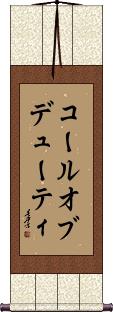Many custom options...
And formats...

Call of Duty in Chinese / Japanese...
Buy a Call of Duty calligraphy wall scroll here!
Personalize your custom “Call of Duty” project by clicking the button next to your favorite “Call of Duty” title below...
Call Of Duty
Call Of Duty
This in-stock artwork might be what you are looking for, and ships right away...
Gallery Price: $61.00
Your Price: $33.88
Not the results for call of duty that you were looking for?
Below are some entries from our dictionary that may match your call of duty search...
| Characters If shown, 2nd row is Simp. Chinese |
Pronunciation Romanization |
Simple Dictionary Definition |
掛 挂 see styles |
guà gua4 kua kake かけ |
to hang; to suspend (from a hook etc); to hang up (the phone); (of a line) to be dead; to be worried; to be concerned; (dialect) to make a phone call; to register (at a hospital); to make an appointment (with a doctor); (slang) to kill; to die; to be finished; to fail (an exam); classifier for sets or clusters of objects (suf,adj-no) (1) -clad; (2) (kana only) in the midst of; (3) tenths (e.g. wholesale price, as tenths of retail price); (4) times (i.e. multiplied by); (5) able-to-seat (of a chair, etc.); (suffix) charge; duty; person in charge; official; clerk; (1) (abbreviation) credit; (2) money owed on an account; bill; (3) (abbreviation) (kana only) hot noodles in broth; (n,n-suf) (4) proportion (of wholesale price, as tenths of list price); (suffix) (5) in the midst of; (6) rest; rack; hanger; (surname) Kake To hang, suspend. |
電話番 see styles |
denwaban でんわばん |
phone duty; being on call |
ラストプラトーン2 see styles |
rasutopuratoontsuu / rasutopuratoontsu ラストプラトーンツー |
(work) Beyond the Call of Duty (film); Lost Platoon 2; (wk) Beyond the Call of Duty (film); Lost Platoon 2 |
The following table may be helpful for those studying Chinese or Japanese...
| Title | Characters | Romaji (Romanized Japanese) | Various forms of Romanized Chinese | |
| Call Of Duty | 決勝時刻 决胜时刻 | jué shèng shí kè jue2 sheng4 shi2 ke4 jue sheng shi ke jueshengshike | chüeh sheng shih k`o chüehshengshihko chüeh sheng shih ko |
|
| Call Of Duty | コールオブデューティ | kooru obu duuti kooruobuduuti koru obu duti | ||
| In some entries above you will see that characters have different versions above and below a line. In these cases, the characters above the line are Traditional Chinese, while the ones below are Simplified Chinese. | ||||
Successful Chinese Character and Japanese Kanji calligraphy searches within the last few hours...






